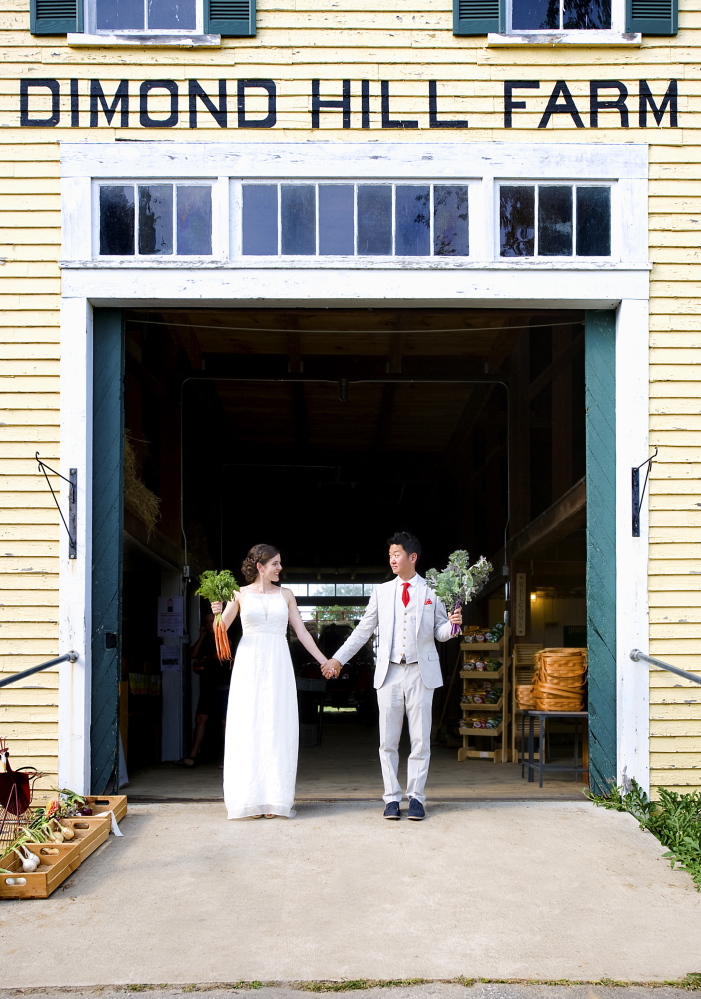EDITOR’S NOTE: Features editor Chelsea Conaboy got married on a working farm in New Hampshire in 2013. Here is her account of the experience.
Our mothers couldn’t understand why we wanted to get married on a farm, especially on this working farm. One asked whether the back side of the massive yellow barn, patched and peeling in places, would be repainted before our wedding day. Another looked dubiously at a scraggly tree whose top was broken and hanging from a tall stump just behind the lovely stonewall where we planned to exchange our vows. They worried separately about how people would know what to wear to such a party, about what a hard rain could do to the rutted path from parking lot to wedding site, about the mosquitoes that would arrive at dusk.
Yoon and I hadn’t planned on a farm wedding. When we started looking at venues, we knew what we didn’t want: a fussy wedding in a hotel ballroom. Weddings cost a lot of money, and we wanted our dollars to go to people and places we could feel good about. More than that, we hoped to avoid the common obsession over wedding accessories and centerpieces, to keep it simple and meaningful.
After weeks of searching for a local restaurant or museum space we could afford in the Boston area, where we lived at the time, a friend told us she had recently stopped by the farmstand at Dimond Hill Farm in Concord, New Hampshire, and seen a wedding party, cocktails in hand, gathered in the barn to escape a passing thundershower. I had lived in Concord for several years, and it was where Yoon and I first met. The fee that Pam Clark, who organizes events at the farm, quoted when we called to inquire was affordable and would entitle us to a full weekend of farm access.
Dimond Hill is a vibrant center of community activity, host to cooking classes, occasional concerts and public trails for walking and skiing. The same family has worked it since 1827. Clark’s partner, Jane Presby, who grows some of the best sweet corn around, is the sixth generation on the farm. Making it the center of our wedding activity set the tone for our celebration.
Instead of a fancy rehearsal dinner, we ordered platters of sandwiches and asked friends to play music on the farmhouse’s back deck. The party ended before 10 p.m. to accommodate the schedule of farmers sleeping upstairs, which for us made getting up early the next morning for a yoga class on top of the grassy hill out back easier. None of the guests arriving for the afternoon wedding seemed to notice the unsightly tree, too taken by the natural grandeur of the farm under a brilliant summer sun.
At the reception, we ate together under a tent at long tables lined with thrift store vases filled with flowers a friend had grown for the occasion and votives in recycled jars my family had been collecting for weeks. We skipped the requisite DJ or band and instead played music from a speaker while friends and family mingled among the blueberry bushes and visited the llamas penned nearby. Photographer friends made stunning images of the moon rising, big and white over the yellow barn. The mosquitoes arrived, but I hardly noticed.
While Dimond Hill is hosting fewer weddings these days, to make time and space for other kinds of events, there is romance in historic farms like this one, just as there is in the seaside inns and Victorian estates around New England that have become common wedding venues, places that have collected stories of love and family – new and old – for generations. For me, the romance was deeper knowing that what we spent to create our memorable day would help to sustain such a special place. The day after our wedding, Clark gave us a farmstand gift card as a token of thanks. We exchanged it for a bag of sweet peaches and left full of gratitude.
Features editor Chelsea Conaboy can be contacted at 791-6362 or at:
cconaboy@pressherald.com
Twitter: @cconaboy
Send questions/comments to the editors.


